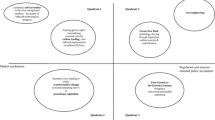Abstract
Conventional economic analysis is rapidly replacing the arguments of the climate skeptics as the principal justification for inaction on climate change. It is important to create an alternative economics that is consistent with the urgency expressed by the latest climate science. Frank Ackerman presents four broad principles that are fundamental to a better analysis of climate economics. First, your grandchildren's lives are important; a low discount rate is needed to validate concern about far-future outcomes. Second, we need to buy insurance for the planet; prevention of catastrophic worst-case risks, not response to average, expected outcomes, should be the motivation for climate policy. Third, climate damages are too valuable to have prices; the impossibility of putting meaningful prices on human life, endangered species, and ecosystems defeats attempts at cost–benefit analysis of climate policy. Fourth, some costs are better than others; the ‘costs’ of active climate policies will create jobs, incomes, and new technologies, while avoiding the physical destruction of the much worse costs of an increasingly extreme climate.
Similar content being viewed by others
Notes
This article draws heavily on my forthcoming book (Ackerman, 2008a).
Nordhaus (2008: 15). His Figure 5.6, p. 102 suggests that ‘optimal’ emissions in 2055 would be about one-third higher than in 2005.
In 2005, there were 511,000 fires in structures (US Census Bureau, 2008, Table 346, http://www.census.gov/statab/www/, accessed 1 March 2008) and 124 million housing units in the US (US Census Bureau, 2008, Table 953).
Based on US average death rates by age, as of 2004 (US Census Bureau, 2008 Table 101).
LIMRA International, an insurance industry research group, reports that in families with dependent children, ‘Twenty-eight percent of wives and 15 percent of husbands have no life insurance at all. Ten percent of families with children under 18 have no life insurance protection.’ From ‘Facts About Life 2007’, http://www.limra.com/pressroom/pressmaterials/07USFAQ.pdf.
For example, see the recent studies of the costs of reduction by McKinsey & Company, an international consulting firm: Enkvist et al. (2007), Creyts et al. (2007) (copies on file with author).
References
Ackerman, Frank (2008a) Can We Afford the Future? Economics for a Warming World, London: Zed Books.
Ackerman, Frank (2008b) Poisoned for Pennies: The Economics of Toxics and Precaution, Washington, DC: Island Press.
Ackerman, Frank and Lisa Heinzerling (2004) Priceless: On Knowing the Price of Everything and the Value of Nothing, New York: The New Press.
Creyts, Jon, Anton Derkach, Scott Nyquist, Ken Ostrowski and Jack Stephenson (2007) Reducing US Greenhouse Gas Emissions: How Much at What Cost? New York: McKinsey & Co.: December.
Enkvist, Per-Anders, Tomas Nauclér and Jerker Rosander (2007) ‘A Cost Curve for greenhouse gas reduction’, The McKinsey Quarterly 1: 35–45.
Kant, Immanuel (2005 [1785]) Groundwork for the Metaphysics of Morals (Grundlegung zur Metaphysik der Sitten). Thomas K. Abbott (trans.); with revisions by Lara Denis; Lara Denis (ed.). Orchard Park, NY: Broadview Press.
Lomborg, Bjørn (2007) Cool It: The Skeptical Environmentalist's Guide to Global Warming, New York: Alfred A. Knopf.
Nordhaus, William D. (2008) A Question of Balance: Economic Modeling of Global Warming, New Haven: Yale University Press.
Ramsey, Frank P. (1928) ‘A Mathematical Theory of Saving’, The Economic Journal 138 (152): 543–559.
Stern, Nicholas (2006) The Stern Review: The Economics of Climate Change, London: HM Treasury.
US Census Bureau (2008) ‘Statistical Abstract of the United States’, 127th edition. Available online.
Weitzman, Martin L. (2008) ‘On Modeling and Interpreting the Economics of Catastrophic Climate Change (forthcoming in Review of Economics and Statistics).
Additional information
Presents four broad principles that are fundamental to a better analysis of climate economics
Rights and permissions
About this article
Cite this article
Ackerman, F. Climate Economics in Four Easy Pieces. Development 51, 325–331 (2008). https://doi.org/10.1057/dev.2008.34
Published:
Issue Date:
DOI: https://doi.org/10.1057/dev.2008.34




